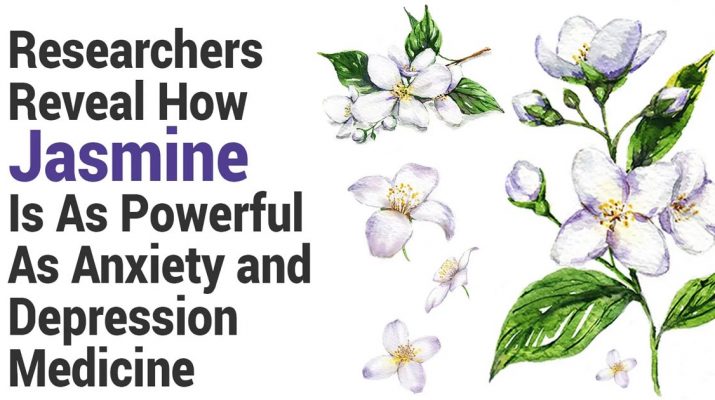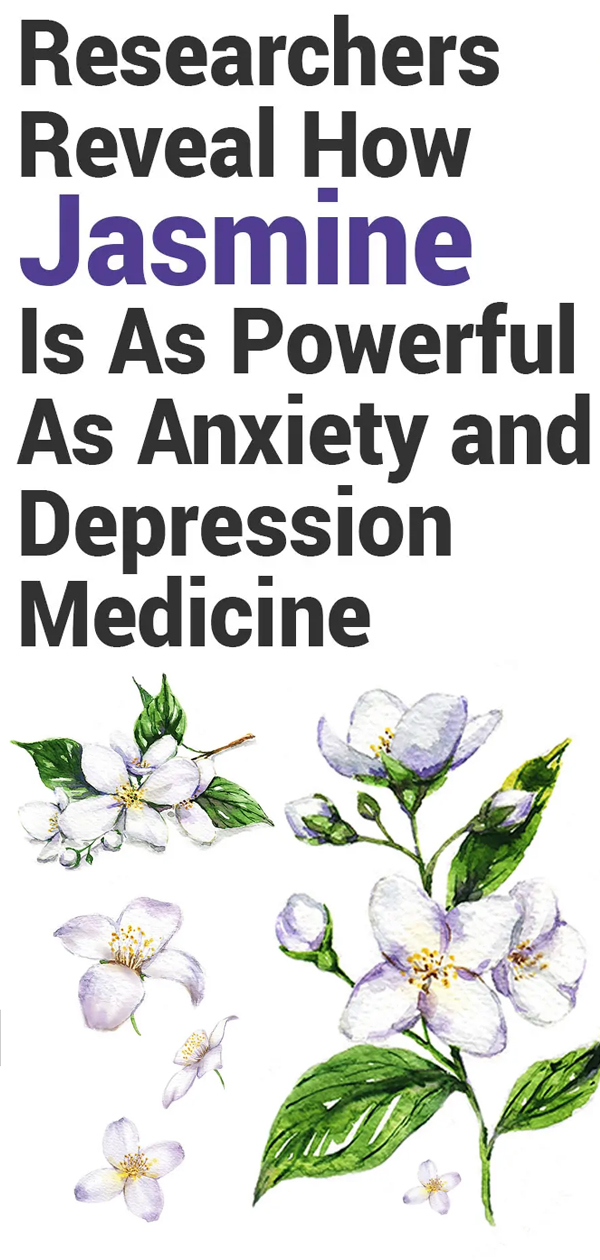Before we get into Jasmine for depression and anxiety, let’s first talk about the conditions themselves. Depression and anxiety are both debilitating problems that often severely disrupt everyday tasks. Those who have to deal with these disorders chronically know just how exhausting it can be to try and manage all the symptoms that come with them. The fact that they aren’t particularly understood makes it even harder.
Medication is often prescribed to those dealing with these conditions. However, those medications come with their share of very unwanted side effects. Although they work and are necessary for many people, they can also be difficult to deal with, leading to weight gain, headaches, and other issues.
As such, natural alternatives to depression and anxiety medications are often sought after by those who need them. Sadly, most of these alternative ways to relieve these symptoms aren’t necessarily the best. Most are not scientifically proven, and even if they are, they only have mild effects. They still don’t work as well as specially made medication.
But recently, scientists have uncovered a surprising finding that indicates that there may be an extremely powerful, all-natural method to relieving depression and anxiety symptoms.
The secret lies in a special olive flower: the jasmine.
Researchers Reveal How Jasmine Is As Powerful As Anxiety And Depression Medicine
1. The Study
The study that revealed the use of jasmine for these purposes is titled “Fragrant Dioxane Derivatives Identify ?1-Subunit-containing GABAA Receptors,” and was published in the Journal of Biological Chemistry. Researchers on the study are, in alphabetical order:
- Andrea Kragler
- Anja Poppek
- Boris Görg
- Günter Gisselmann
- Hanns Hatt
- Helmut L. Haas
- Hermann Lübbert
- Olaf Kletke (lead researcher)
- Olga A. Sergeeva (lead researcher)
- Stephan R. Schubring
- Xin-Ran Zhu
- Wiebke Fleischer
This group of researchers conducted tests in order to determine the effects of a wide range of scents’ effects on certain receptors, including a chemical known as GABA, which is also known as gamma-Aminobutyric acid. GABA works by reducing the excitement of the nerves and regulating nervous system responses.
Hundreds upon hundreds of different types of scents were tested during this experiment, both on mice in cages and on humans. Through this study, researchers discovered something new: a type of GABA receptor that responds to respiratory air through external administration.
When stimulated, GABA was triggered by certain types of fragrances, promoting a relaxing, calming, and soothing effect on mice in cages. Not only do these findings indicate that aromatherapy may have a lot of positive merit to it, but it also indicated which scents work best. It is also believed that the scent molecules used can be altered to be even more effective.
2. Why Is Jasmine The Best Scent For Anxiety And Depression Relief?
During the aforementioned study, jasmine was revealed to boost the effect of GABA in calming the nervous system significantly. In fact, the effect was increased by over five times, successfully proving to be just as strong and usable as:
- Relaxants
- Sedatives
- Sleeping pills
- Antidepressants
It is worth noting that many types of the aforementioned medication result in side effects that are not present when jasmine is used. These side effects include:
- Depression
- Muscle weakness
- Dizziness
- Coordination difficulty
- Hypotension
Give the fact that jasmine does not cause any of these side effects, the study successfully showed how some natural methods can be even more effective and usable than common medications.
When you inhale scent molecules from jasmine, your body receives messages to the limbic system, which is a portion of the brain that is responsible for nervous system influence.
Jasmine can be used in your room as a plant for anxiety-relieving purposes, but you can also opt to use jasmine essential oils in a diffuser to enjoy the scent. Apart from its positive effects on depression and anxiety, jasmine can also:
- Aid in sleeping
- Boost sleep quality
- Help balance hormones
- Promote healthier emotional regulation
- Improve focus
- Lower infection risk
- Serve as an aphrodisiac
This means that jasmine is multi-functional and can help improve your life in multiple different ways. The idea that just one plant can do so much is truly mind-blowing, and the fact that there’s lots of science backing it up makes it even better!
3. Other Plants That Aid Mental Health
Jasmine isn’t the only plant that produces a helpful scent for more positive mental health. Here are some other options:
· Lavender
This plant contains linalool, which is a kind of alcohol that can provide stress-relieving effects on those with anxiety when the scent is inhaled. It also aids in menstrual pain management, alopecia treatment, and heart rate lowering.
· Aloe Vera
This multi-use plant is typically used for treating injuries, but having it in your home can actually contribute to overall wellbeing. It helps to filter out formaldehyde, benzene, and carbon monoxide and dioxide, which can all lead to worsened anxiety symptoms.
· Snake Plant
This interestingly named flora is well-known for its ability to improve the air quality of any room. Simply put, the better the air quality, the less likely you are to become excessively stressed out or anxious.
· Rosemary
This scent of this plant can be very relaxing and soothing, and many people are able to enjoy less severe symptoms of depression and anxiety when it is in a room with them. The fact that you can use it for cooking just adds to its positive benefits!
· English Ivy
This plant is also great for improving air quality. It helps to absorb excess formaldehyde in the air. It can also help to ease insomnia, allowing for a deeper and more restful sleep. If you have asthma or a similar respiratory disorder, you can also enjoy cleaner air thanks to this ivy!
· Boston Fern
Once again, this plant is capable of easily clearing the air of harmful toxins. In fact, it can get rid of nearly 2,000 toxins in just a single hour! It is also known to aid in anxiety relief, as it has calming properties.
· Gerbera
This brightly colored flowering plant works 24/7 to clean toxins from the air. This means it continues to do so as you sleep, which improves sleep quality. In addition, its vibrant hue can be a great mood lifter.
· Basil
Like lavender, basil also contains linalool, and it has a very clean scent that can help make you feel calmer. It is also commonly used in cooking, so it’s a plant that will give more than it gets.
· Peppermint
We all know the smell of mint. This scent is great for promoting relaxation. It often helps ease muscle tension as well as preventing overly high-stress responses.
4. Other Essential Oils That Aid Mental Health
As we mentioned, jasmine essential oils can work just as well for stimulating your senses to promote relief from depression and anxiety.
Here are some other essential oils that provide these useful effects:
· Cedarwood Oil
Cedarwood oil aids in stress management. Research also indicates a link between this oil and more positive work performance. New, recent studies show a chance it could serve as a powerful antidepressant for stronger positive thinking.
· Lemon Oil
Lemon oil smells refreshing, allowing it to uplift your mood and make you feel more awake. In the process, you’ll enjoy better positive thinking.
· Clary Sage Oil
Clary sage oil has been shown to help enhance one’s mood, preventing unpredictable mood swings. It has also been found to successfully aid in the balancing of thyroid hormones, which helps to reduce depression and keep the chemicals in the brain sharp.
· Ylang Ylang Oil
Ylang ylang oil has been used in traditional medicine for centuries, as it is known to aid in relaxation. Its soothing properties help to manage and balance certain brain chemicals, especially those related to depression and anxiety.
· Sandalwood Oil
Sandalwood oil may not be the cheapest of the essential oils out there, but it works wonders on symptoms of depression. It can help to ground you, preventing strong negative mood drops and keeping you more rooted in reality.
· Nutmeg Oil
Nutmeg oil provides a lot of the same results that antidepressants do, but without all the side effects commonly associated with medications. Its warm scent is equal parts soothing and uplifting.
· Vetiver Oil
Vetiver oil isn’t nearly as popular as the other ones listed here, but its strong sedative effect makes it perfect for those with anxiety. It produces calming scents that help reduce stress levels, and it can also help alleviate insomnia. Its earthy vibe allows it to help keep you grounded through the hustle and bustle of life.
· Chamomile Oil
Chamomile oil is fantastic for relaxing the nervous system. If you drink chamomile tea or use chamomile products for injury relief, then you know just how soothing this plant can be! Go for German chamomile oil for best results.
Do note that you should never apply pure essential oil directly onto your body.
These oils for anxiety and depression are meant to be used with a diffuser or burner in order to spread the scent onto the air. Undiluted essential oils can burn the skin and cause more harm than good, so if you plan to apply some, make sure you are using a carrier oil to tame its concentration.
Final Thoughts On How Jasmine Is As Powerful As Anxiety And Depression Medicine
Is jasmine necessarily a replacement for depression or anxiety medication? Not in the true sense, but it can make for a good additional “supplement” to them if you still struggle to get by on prescribed medicine.
However, if you cannot afford or have not been prescribed regular medication, then jasmine may help alleviate certain symptoms.
There are plenty of tried methods that can provide similar benefits. Many people have been able to find solutions that help reduce the severity of some symptoms, and jasmine is one of them. Its incredible, scientifically proven effects are amazing for boosting positive thinking and overall relaxation.
Do note that you should never stop taking prescribed medication for mental health disorders without approval from your doctor.
You can, however, speak to a medical professional about the possibility of using natural alternatives to your medication or talk about lessening dosages. Of course, if your doctor says that this isn’t a good idea, trust that they know best!
At the end of the day, you’ll know what works for you and what doesn’t. Remember that jasmine isn’t a one-size-fits-all solution, so don’t be afraid to try a few other common symptom relievers while you’re at it! There is no shortage of options available out there for you to try.


